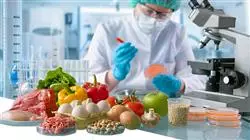University certificate
The world's largest faculty of nutrition”
Introduction to the Program
Acquires analytical and problem solving skills, fundamental in decision making during the application of chemistry in Bioprocesses”

Food Bioprocesses, which combine Chemical Engineering, are a discipline in constant evolution that seeks to optimize food production and improve its nutritional value, thus contributing to the improvement of the health and welfare of the population. This Postgraduate certificate program will provide students with the most important technical concepts for the implementation of the virtues offered by this science in food production.
This will be achieved through the complete academic itinerary that is composed of two modules that bring together all the necessary elements to master this field in depth. Thus, students will learn about chemical fundamentals and processes, including matter and energy balances in chemically reactive and non-chemically reactive systems. In addition, the techniques of integrated food science, such as size reduction and augmentation, will be addressed.
Likewise, professionals will improve their skills and knowledge to face the challenges that exist within this constantly evolving labor market, in which they will be able to apply all their learning immediately and increase their professional expectations to a higher level.
This program is offered through the innovative Relearning methodology, which allows 100% online learning, giving students the flexibility to study from anywhere and at any time that suits them. In addition, they will have access to multimedia resources 24 hours a day, allowing them to assimilate the content at their own pace. In addition, through the analysis of practical cases, participants will develop problem-solving skills by facing simulations of realistic situations.
Discover how to implement the basic concepts of chemistry and apply them with great skill in food production”
This Postgraduate certificate in Chemical Engineering in Food Bioprocesses contains the most complete and up-to-date scientific program on the market. The most important features include:
- The development of case studies presented by experts in Chemical Engineering in Food Bioprocesses
- The graphic, schematic, and practical contents with which they are created, provide scientific and practical information on the disciplines that are essential for professional practice
- Practical exercises where self-assessment can be used to improve learning
- Its special emphasis on innovative methodologies
- Theoretical lessons, questions to the expert, debate forums on controversial topics, and individual reflection assignments
Content that is accessible from any fixed or portable device with an Internet connection
Access multimedia resources 24 hours a day to assimilate content and keep up to date with the latest trends in the food industry”
The program’s teaching staff includes professionals from sector who contribute their work experience to this educational program, as well as renowned specialists from leading societies and prestigious universities.
Its multimedia content, developed with the latest educational technology, will provide the professional with situated and contextual learning, i.e., a simulated environment that will provide an immersive education programmed to learn in real situations.
The design of this program focuses on Problem-Based Learning, by means of which the professional must try to solve the different professional practice situations that are presented throughout the academic course. This will be done with the help of an innovative system of interactive videos made by renowned experts.
Take advantage of this opportunity and learn at your own pace, without the need to go to a study center”

Take advantage of the flexibility offered by the Relearning methodology and study 100% online from anywhere and at the time that suits you best”
Why study at TECH?
TECH is the world’s largest online university. With an impressive catalog of more than 14,000 university programs available in 11 languages, it is positioned as a leader in employability, with a 99% job placement rate. In addition, it relies on an enormous faculty of more than 6,000 professors of the highest international renown.

Study at the world's largest online university and guarantee your professional success. The future starts at TECH”
The world’s best online university according to FORBES
The prestigious Forbes magazine, specialized in business and finance, has highlighted TECH as “the world's best online university” This is what they have recently stated in an article in their digital edition in which they echo the success story of this institution, “thanks to the academic offer it provides, the selection of its teaching staff, and an innovative learning method aimed at educating the professionals of the future”
A revolutionary study method, a cutting-edge faculty and a practical focus: the key to TECH's success.
The most complete study plans on the university scene
TECH offers the most complete study plans on the university scene, with syllabuses that cover fundamental concepts and, at the same time, the main scientific advances in their specific scientific areas. In addition, these programs are continuously being updated to guarantee students the academic vanguard and the most in-demand professional skills. In this way, the university's qualifications provide its graduates with a significant advantage to propel their careers to success.
TECH offers the most comprehensive and intensive study plans on the current university scene.
A world-class teaching staff
TECH's teaching staff is made up of more than 6,000 professors with the highest international recognition. Professors, researchers and top executives of multinational companies, including Isaiah Covington, performance coach of the Boston Celtics; Magda Romanska, principal investigator at Harvard MetaLAB; Ignacio Wistumba, chairman of the department of translational molecular pathology at MD Anderson Cancer Center; and D.W. Pine, creative director of TIME magazine, among others.
Internationally renowned experts, specialized in different branches of Health, Technology, Communication and Business, form part of the TECH faculty.
A unique learning method
TECH is the first university to use Relearning in all its programs. It is the best online learning methodology, accredited with international teaching quality certifications, provided by prestigious educational agencies. In addition, this disruptive educational model is complemented with the “Case Method”, thereby setting up a unique online teaching strategy. Innovative teaching resources are also implemented, including detailed videos, infographics and interactive summaries.
TECH combines Relearning and the Case Method in all its university programs to guarantee excellent theoretical and practical learning, studying whenever and wherever you want.
The world's largest online university
TECH is the world’s largest online university. We are the largest educational institution, with the best and widest online educational catalog, one hundred percent online and covering the vast majority of areas of knowledge. We offer a large selection of our own degrees and accredited online undergraduate and postgraduate degrees. In total, more than 14,000 university degrees, in eleven different languages, make us the largest educational largest in the world.
TECH has the world's most extensive catalog of academic and official programs, available in more than 11 languages.
Google Premier Partner
The American technology giant has awarded TECH the Google Google Premier Partner badge. This award, which is only available to 3% of the world's companies, highlights the efficient, flexible and tailored experience that this university provides to students. The recognition as a Google Premier Partner not only accredits the maximum rigor, performance and investment in TECH's digital infrastructures, but also places this university as one of the world's leading technology companies.
Google has positioned TECH in the top 3% of the world's most important technology companies by awarding it its Google Premier Partner badge.
The official online university of the NBA
TECH is the official online university of the NBA. Thanks to our agreement with the biggest league in basketball, we offer our students exclusive university programs, as well as a wide variety of educational resources focused on the business of the league and other areas of the sports industry. Each program is made up of a uniquely designed syllabus and features exceptional guest hosts: professionals with a distinguished sports background who will offer their expertise on the most relevant topics.
TECH has been selected by the NBA, the world's top basketball league, as its official online university.
The top-rated university by its students
Students have positioned TECH as the world's top-rated university on the main review websites, with a highest rating of 4.9 out of 5, obtained from more than 1,000 reviews. These results consolidate TECH as the benchmark university institution at an international level, reflecting the excellence and positive impact of its educational model.” reflecting the excellence and positive impact of its educational model.”
TECH is the world’s top-rated university by its students.
Leaders in employability
TECH has managed to become the leading university in employability. 99% of its students obtain jobs in the academic field they have studied, within one year of completing any of the university's programs. A similar number achieve immediate career enhancement. All this thanks to a study methodology that bases its effectiveness on the acquisition of practical skills, which are absolutely necessary for professional development.
99% of TECH graduates find a job within a year of completing their studies.
Postgraduate certificate in Chemical Engineering in Food Bioprocesses
Chemical engineering in food bioprocesses is a career with a great impact on the food industry. Chemical engineers in food bioprocesses are responsible for developing chemical processes for food production, from the selection of raw materials to the production of final products. During the Postgraduate certificate course, students will learn the fundamentals of chemistry and biotechnology as applied to food processes, as well as the legal and regulatory aspects of food production.
The curriculum is designed to provide students with the knowledge and skills needed for a career in the food bioprocessing industry.
The curriculum of the Postgraduate certificate course in chemical engineering in food bioprocesses is rigorous and challenging, as it focuses on providing students with the skills necessary to meet the challenges faced in today's food industry. Students will have the opportunity to apply their theoretical knowledge in practical projects using advanced technologies in specialized laboratories. In addition, the program includes a variety of electives that will allow students to focus on specific areas of their interest, such as functional food engineering or food safety.
The program includes a variety of electives that will allow students to focus on specific areas of their interest, such as functional food engineering or food safety.
Career Opportunities in Chemical Engineering in Food Bioprocesses
Chemical engineering in food bioprocesses is an ever-growing career, which means there are many career opportunities for graduates. Food bioprocess chemical engineers can work in a wide range of areas, including food production, new product development, research and development, process engineering and quality management. In addition, the food industry is one of the largest and most diverse in the world, which means that graduates can work in different types of companies, from small, family-owned businesses to large multinational corporations.
In conclusion, chemical engineering in food bioprocessing is an exciting and challenging career that offers many career opportunities for graduates. Students of the Postgraduate certificate course in this discipline will have the opportunity to acquire the necessary skills to meet the challenges of the food industry and develop chemical processes for the production of high quality and safe food. If you are interested in a career in the food industry, chemical engineering in food bioprocessing is an excellent choice.
"







